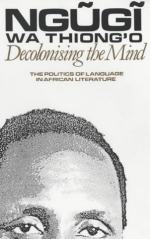|
This section contains 827 words (approx. 3 pages at 400 words per page) |

|
Structure
This work is broken into four essays of varying length. The first three essays each address some form of “language,” loosely and expansively defined beyond the English language, namely African literature, African theatre, and African fiction. In fact, these chapter headings, which explicitly describe literature, theater, and fiction as “languages,” replicate Ngũgĩ's argument that languages function as cultures and can construct entire worldviews. Here, various forms of expressions are all treated as languages, which is to say that they serve certain purposes of communication and help to carry African culture and history.
In some sense the middle two chapters on African theater and fiction also demonstrate how Ngũgĩ's call for more radical, subversive forms of African literary expression might manifest themselves. In the example of the village theater, Ngũgĩ's Gĩkũyũ play eventually becomes so subversive that state police intervene...
|
This section contains 827 words (approx. 3 pages at 400 words per page) |

|




